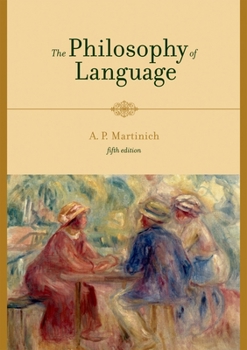The Philosophy of Language, 5th edition
Select Format
Select Condition 
Book Overview
What is meaning? How is linguistic communication possible? What is the nature of language? What is the relationship between language and the world? How do metaphors work? The Philosophy of Language, considered the essential text in its field, is an excellent introduction to such fundamental questions. This revised edition collects forty-six of the most important articles in the field, making it the most up-to-date and comprehensive volume on the subject. Revised to address changing trends and contemporary developments, the fifth edition features seven new articles including influential work by Mark Crimmins, Gottlob Frege, David Kaplan, Frederick Kroon, W. V. Quine, and Robert Stalnaker (two essays). Other selections include classic articles by such distinguished philosophers as J. L. Austin, John Stuart Mill, Hilary Putnam, Bertrand Russell, John R. Searle, and P. F. Strawson.
The selections represent evolving and varying approaches to the philosophy of language, with many articles building upon earlier ones or critically discussing them. Eight sections cover the central issues: Truth and Meaning; Speech Acts; Reference and Descriptions; Names and Demonstratives; Propositional Attitudes; Metaphor and Pretense; Interpretation and Translation; and The Nature of Language. A general introduction and introductions to each section give students background to the issues and explain the connections between them. A list of suggested further reading follows each section.
The selections represent evolving and varying approaches to the philosophy of language, with many articles building upon earlier ones or critically discussing them. Eight sections cover the central issues: Truth and Meaning; Speech Acts; Reference and Descriptions; Names and Demonstratives; Propositional Attitudes; Metaphor and Pretense; Interpretation and Translation; and The Nature of Language. A general introduction and introductions to each section give students background to the issues and explain the connections between them. A list of suggested further reading follows each section.
Format:Paperback
Language:English
ISBN:0195188306
ISBN13:9780195188301
Release Date:December 2006
Publisher:Oxford University Press
Length:704 Pages
Weight:2.15 lbs.
Dimensions:1.4" x 6.7" x 9.6"
Customer Reviews
2 ratings
Anthologies = Good
Published by Thriftbooks.com User , 20 years ago
I, being both a philosophy student and a person with an unreliable attention span, would generally recommend Oxford's anthologies in modern philosophy. It is much more manageable than reading a whole work written by a single author, and it is a real timesaver if you simply want a broad overview of what is going on. I am fixated on semantics, so the Reference and Names sections really did it for me. Do not forget to check out "Philosophy of Mind," and "Philosophy of Time," brought to you by Oxford University Press. I am somewhat doubtful of the earlier review, which seemed to suggest that the educated layperson can simply pick up the book and dive in. I thought once that I was stragically positioning myself in taking a Philosophy of Language course, concurrently with a Logic course, before the rest of my program. However, if you are entirely unfamiliar with the schools of thought and are unaccustomed to thinking philosophically - which nowadays is DIFFERENT from pondering good and evil, life, God, and so forth -, you might not fully benefit. Still, at the same time, this book is a good way to shock yourself into the proper habits of thinking. Just do not let it fool you into thinking you will like linguistics, which is an empirical science, and which is rather different in its aims and means of analysis.
Just the Classics
Published by Thriftbooks.com User , 23 years ago
Anyone serious about meaning in language should read these articles. They provide a baseline on which all other work builds. Whether you are interdisciplinary or only care about linguistics, philosophy, artificial intelligence or cognition, this book is one must-read paper after another.I used it for both my graduate semantics and undergraduate philosophy of language classes at Carnegie Mellon. You can read these papers on your own -- they're actually very accessible for papers on philosophy and do not require any prior logical background (though an intro to logic would surely help). Taken together, this book is the perfect basis for a quarter, semester or whole year of philosophy of language. The book's organized into sections on Truth and Meaning (Quine's classic paper on empiricism, Church on intensionality, Davidson and Strawson on truth and Tarski on semantics), Speech Acts (Austin on Performatives, Searle on Speech Acts, Grice on cooperation), Reference and Descriptions (Frege on sense and reference, Russell on denoting and descriptions with Strawson's reply on referring), Names and Demonstratives (Kripke on Naming and necessity and Putnam on meaning and reference), Propositional attitudes (Quine and Kaplan on quantifiers, Davidson and Kripke on propositional content, and Barwise and Perry on situation semantics), Metaphor (Davidson's classic paper, though I believe the second edition contained Searle's excllent paper on metaphor), Interpretation (Quine on meaning and Searle on indeterminancy), and the Nature of Language with what's left (Wittgenstein and Kripke on privacy, and Chomsky on semantic innateness).





